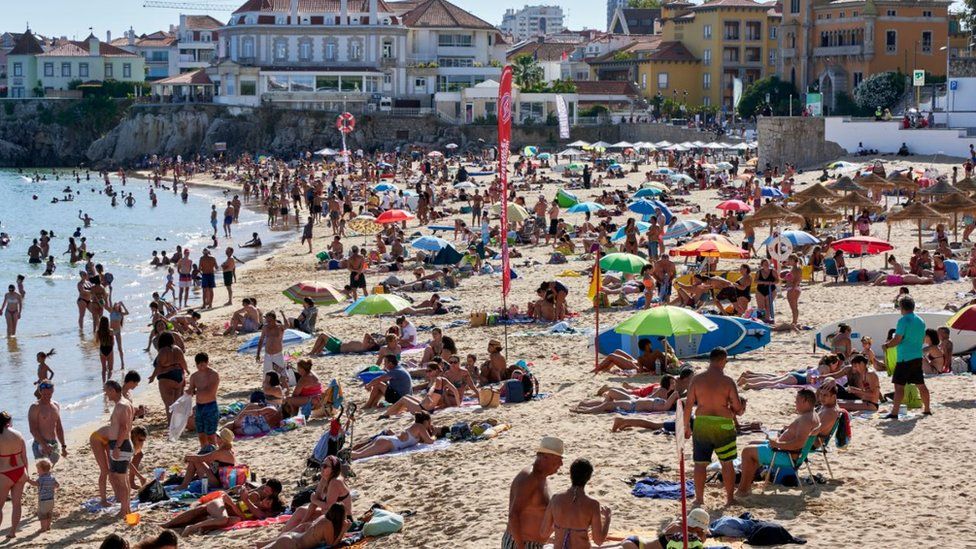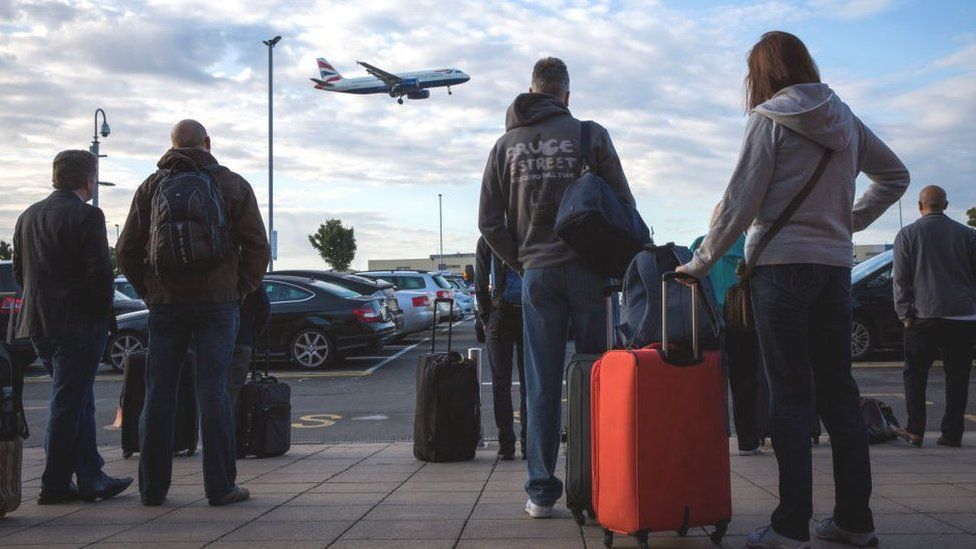Covid: Travel firms reject ‘overly cautious’ green liston May 8, 2021 at 2:18 am
The UK will be ‘left behind’ if other countries open up travel more quickly, the industry says.

image copyrightGetty Images
The travel industry has expressed disappointment that so few countries are on the UK government’s green list for travel, describing the announcement as “overly cautious”.
The traffic light system means travel abroad from 17 May will not be illegal.
The 12 green list countries, which include Portugal, Gibraltar and Israel, will not require people to quarantine on return to England.
Firms said leaving the US off the list would risk the UK “falling behind”.
Travel to amber or red lists countries is not advised.
The change in travel rules applies to England, Scotland, Wales and Northern Ireland have not said when they might ease their strict travel rules.
Only four of the countries on the green list are in Europe, and Portugal is the only large holiday destination from the continent on the list.
Israel and Singapore are also included, but Australia and New Zealand – which are approved as safe by the UK government – are not currently allowing in visitors from abroad.
France, Greece, Italy and Spain, normally hugely popular holiday destinations for UK travellers, are not included on the safe list.
Andrew Flintham, managing director of holiday firm TUI, said: “While we were expecting to see just a handful of destinations on the green list, this is an overly cautious start.”
Airlines UK, representing UK carriers, described it as “a missed opportunity” and “a reopening of air travel in name only” which left the UK “at risk of falling behind”.
And Easyjet chief executive Johan Lundgren said: “The decision to put so few European countries into the green tier is simply not justified by the data or the science, and is inconsistent with the approach to reopen the domestic economy.”
UK citizens risked missing out on bookings for hotels if other European tourists were permitted to travel, he added.

image copyrightGetty Images
Making the announcement, Transport Secretary Grant Shapps said the easing of restrictions was “necessarily cautious” in the light of the threat from new variants of Covid-19.
He said the UK’s success in combating the virus was not matched in many other countries.
However he said the list would be reviewed every three weeks by the Joint Biosecurity Centre – the team set up last year to monitor the threat from the virus.
Some firms had hoped the rapid roll out of the vaccination programme in the US would allow summer travel to resume there more quickly.
“There is no reason for the US to be absent from the green list. This overly cautious approach fails to reap the benefits of the UK’s successful vaccination programme,” a spokesperson for Virgin Atlantic – one of the airlines which relies heavily on UK-US traffic – said.
“A transatlantic travel corridor is vital to deliver a much-needed boost to economic recovery,” the spokesperson added.
But British Airways predicted that more countries would be included before the summer.
“What’s clear is that with high levels of vaccination in the UK being matched by other countries, we should see more destinations going ‘green’ before the end of June,” BA chief executive Sean Doyle said.
“We cannot stress more greatly that the UK urgently needs travel between it and other low-risk countries like the US, to re-start the economy, support devastated industries and reunite loved ones.”
Meanwhile, Ryanair, Easyjet, Tui and British Airways all said they would be increasing their flights to Portugal and other destinations on the green list.
Tourist-dependent firms in Portugal were quick to welcome the news.
“No-one enjoys a holiday more than the British people,” said Miguel Campino, owner of Maria’s Restaurant – a beach venue on Praia do Garrão Poente.
“They bring a colourful atmosphere to all the restaurants, bars and hotels. This is a happy moment for everyone, for Portugal, for England… it’s great news.”
João Fernandes, president of the Algarve Tourism Bureau, also said the region was ready to welcome UK visitors back.
“We are obviously delighted with the news,” he said. “It’s a recognition of the remarkable work Portugal has done in reducing levels of Covid to be able to restart the economy safely.”
It comes as ministers continue talks with Uefa about holding the Champions League final between Chelsea and Manchester City in the UK, after host nation Turkey was added to England’s travel red list.
From 04:00 BST on Wednesday 12 May, travellers from Turkey, as well as those from the Maldives and Nepal, will have to quarantine in a hotel for 10 days on their return.
Environment Secretary George Eustice told BBC Breakfast that the UK had offered to host the match but that it would “ultimately be a decision for Uefa”.
However, the UK consumer body Which? warned that practical difficulties over taking a holiday abroad would remain.
“Travellers will have an expectation that these new government rules should protect their health and their money, yet serious issues around lengthy airport queues and a broken testing system remain unresolved,” Rory Boland, editor of Which? Travel, said.


Although international travel has been heavily restricted since January, returning travellers have experienced long delays at border control when arriving at Heathrow, sometimes waiting for up to six hours.
Private firms offering Covid tests to returning travellers have been criticised for failing to deliver tests and results on time.
“Travellers should also be aware that there is still some financial risk involved in booking travel plans, depending on how you book and which company you choose,” said Mr Boland.
“In a summer when further disruption can be expected, travel companies must be honest about the risks holidaymakers may be taking on. Crucially, holidaymakers also need to do their research before booking, as choosing the right provider could be the difference between getting hundreds of pounds back or just getting the run-round.”
A further 15 deaths in the UK within 28 days of a positive test were reported on Friday, bringing the total to 127,598. There were 2,490 new cases.
More than 35 million first doses of a coronavirus vaccine have been given and more than 16.7 million second doses.


